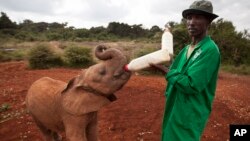WASHINGTON DC —
Zimbabwe says at least 80 elephants have been killed by poachers who poisoned their drinking water using cyanide in the Hwange National Park a few weeks ago.
An inter-ministerial delegation which visited the park Saturday says the number of dead elephants has risen from the estimated 41 as more elephant herds are suspected to have frequented the poisoned water holes.
Environment, Water and Climate Minister Saviour Kasukuwere has blamed the ecological disaster on sanctions imposed by the West on President Robert Mugabe and his Zanu-PF colleagues.
Kasukuwere told the state-controlled Herald newspaper that the Department of National Parks has not been able to access international funding for its operations due to the sanctions.
He said the department is failing to pay salaries and allowances of its 50 game rangers who are currently using battered vehicles.
Kasukuwere said the department needs at least $40 million to get back on track.
Ecologists said the Ministry of Environment should channel more national resources towards the protection of wildlife.
Jonny Rodriguez, chairman of the Zimbabwe Conservation Task Force, said the Department of Wildlife Management should, in the short-term, try to drive away animals from the poisoned watering points in Hwange National Park to avoid more deaths.
Elephant tusks are reportedly fetching high prices in Asian markets where they are converted into aphrodisiacs and other upmarket products.
In Cameroon, a court Monday found Symphorien Sangha guilty of killing and seriously wounding a forest ranger. The same court will reach a verdict against his twin brother, Rene, on Friday.
Together the two men are believed to have killed more than 100 elephants in central Africa. The World Wildlife Fund says the case shows increased collaboration between regional governments to crack down on the problem.
An inter-ministerial delegation which visited the park Saturday says the number of dead elephants has risen from the estimated 41 as more elephant herds are suspected to have frequented the poisoned water holes.
Environment, Water and Climate Minister Saviour Kasukuwere has blamed the ecological disaster on sanctions imposed by the West on President Robert Mugabe and his Zanu-PF colleagues.
Kasukuwere told the state-controlled Herald newspaper that the Department of National Parks has not been able to access international funding for its operations due to the sanctions.
He said the department is failing to pay salaries and allowances of its 50 game rangers who are currently using battered vehicles.
Kasukuwere said the department needs at least $40 million to get back on track.
Ecologists said the Ministry of Environment should channel more national resources towards the protection of wildlife.
Jonny Rodriguez, chairman of the Zimbabwe Conservation Task Force, said the Department of Wildlife Management should, in the short-term, try to drive away animals from the poisoned watering points in Hwange National Park to avoid more deaths.
Elephant tusks are reportedly fetching high prices in Asian markets where they are converted into aphrodisiacs and other upmarket products.
In Cameroon, a court Monday found Symphorien Sangha guilty of killing and seriously wounding a forest ranger. The same court will reach a verdict against his twin brother, Rene, on Friday.
Together the two men are believed to have killed more than 100 elephants in central Africa. The World Wildlife Fund says the case shows increased collaboration between regional governments to crack down on the problem.




